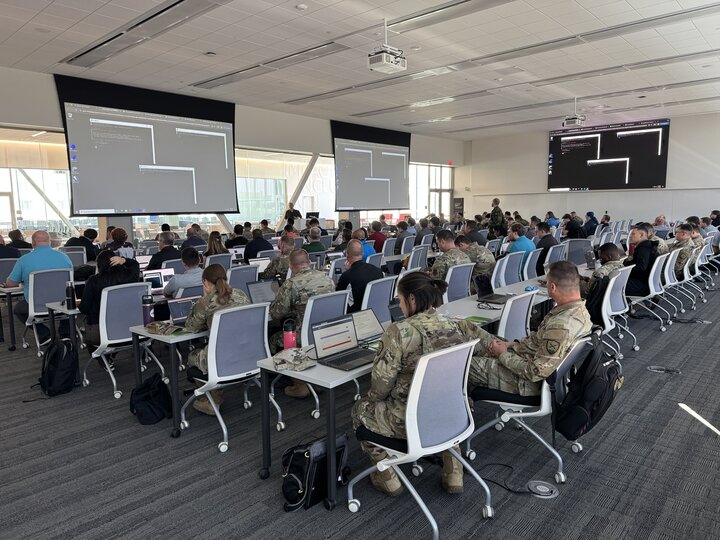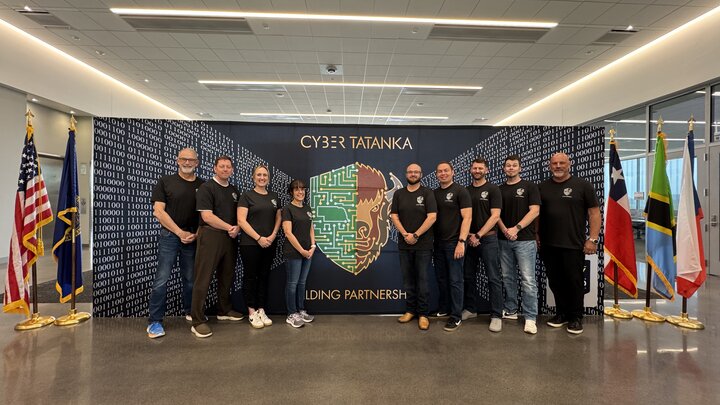In the Native American Lakota tribe, the bison was an essential part of culture and life, providing the people with food, clothing, shelter, tools, and connection to the earth. Bison, or “tatanka,” were revered by the Lakota as a life-sustaining resource to be protected.
In 2019, the Nebraska National Guard partnered with members of the Nebraska cybersecurity community to develop a training program for military members and civilians, believing that today’s interconnected systems are a vital resource in our modern life that must also be protected. In a fitting honor to the Lakota tribe, the program team named their new initiative “Cyber Tatanka.”
The University of Nebraska–Lincoln’s College of Engineering hosted Cyber Tatanka 2025 June 2-13 in Kiewit Hall. Cyber Tatanka is a two-week exercise offering realistic, hands-on cyber range training within an unclassified, closed computing environment. Through collaborative learning, participants develop critical cybersecurity skills and gain practical experience in cyber defense.
“The idea of the exercise is to build capacity for incident response capabilities,” said Ryan Carlson, lead technical planner of Cyber Tatanka and executive director of Cyber Strong Nebraska, a non-profit organization dedicated to enhancing cybersecurity awareness, education, and resources across the state. “Ideally, when they leave, their incident response plan is in a better place, and if they do have to execute that plan in a real situation, they're familiar with it, they've done it, they know what to do, and they know the rules. They're able to respond quicker and minimize damage to their network due to an attack.”
Cyber Tatanka participants spend the first week in classroom training, developing individual skills through original courses focused on tools, management processes, and frameworks. During the second week, participants are grouped into teams and enclaves based on industry sectors and tasked with responding to nefarious activity in a live-range environment. Through a partnership with Cloud Range, a cybersecurity simulation training platform, teams spend each day immersed in a different type of realistic attack scenario, working through the identification, eradication, and recovery process from start to finish.
“They’ll take the theory that they've learned in classes and actually apply it in a no-risk scenario,” said ITS Director of IT Incident Response, Disaster Recovery and Business Continuity Eric Haffey. “It gives them a chance to learn and fail in a stressful situation that has no consequences. If they were doing this in the real world, there would be a lot of consequences.”

In addition to providing a unique educational and training opportunity, Cyber Tatanka aims to strengthen cross-sector partnerships by bringing together industry leaders, National Guard units, international military partners, government agencies with a common goal of enhancing cyber readiness and providing key services that benefit both the community and participants.
Cyber Tatanka is led by Cyber Strong Nebraska in partnership with the Nebraska National Guard and other state organizations, including the Nebraska Public Power District, LES, Union Bank & Trust, Byran Health, and the University of Nebraska. Haffey and Assistant Vice President of IT Security Services and interim UNL CIO Rick Haugerud are both members of the Cyber Tatanka planning committee and have helped to fortify a relationship with the University of Nebraska–Lincoln, particularly with University ITS and the College of Engineering.
Cyber Tatanka 2025 marks the fourth annual training exercise event and the third hosted by the University of Nebraska–Lincoln. Cyber Tatanka 2024 was the first event to be held in the newly built Kiewit Hall, home to the College of Engineering. The college hosted the event in Kiewit Hall for the second time this year, welcoming 212 participants from four countries, six states, 12 critical infrastructure sectors, and several organizations. This year’s event was also opened to students from the University of Nebraska and other Nebraska educational institutions, including eight from the School of Computing.
“This is the first time we've had any students involved,” Haffey said. “That was a request from Dean Perez, and the committee thought it was a really good idea. It's really hard to find qualified people, and this gets these students introduced to people who are already doing this, so they can start building that network.”
Carlson said helping to build support networks is not only a goal of Cyber Tatanka, but also something he’s seen pay off in real-life crisis situations over the past few years.
“Having those partnerships has just been huge,” Carlson said. “Once you've built that rolodex of a bigger circle of people that you know in the sector, you’ve got people that you can call if you’re seeing something odd and don't know what it is. It's a very open community in that, if we see things that are broken or need to be secured, we're not holding that from one another.”
Carlson noted that the live-fire training also serves as a resume-building component for attendees, offering a type of learning experience they can’t get in most classrooms.
“These students are spending a lot of time not only learning theory, but also learning how to use tools, and not only using tools, but seeing how tools contribute to the response process,” Carlson said. “I think that's huge to take into an interview, and we do see this as a differentiator for those who get to participate.”
Lourdes Herling, treasurer and director of Cyber Strong Nebraska and cybersecurity governance, risk and assurance manager of the Nebraska Public Power District, said that Cyber Tatanka provides security operations teams with an opportunity to execute, test, and improve their incident response plans prior to an actual security breach.
“In most organizations, they do tabletop exercises for their incident response plans at least once a year, but that's hugely different,” Herling said. “You can talk through it hypothetically, but if you don’t train with your hands on the keyboard, it's different from actually finding malware on the system. This gives them that experience to respond the way they train.”
Tim Pospisil, board president of Cyber Strong Nebraska and Director of Security Technology Outreach & Chief Security Officer at the Nebraska Public Power District, agreed Cyber Tatanka offers attendees a chance to train for high-stress situations under low-stress conditions.
“When they're going to do what we're having them do in this environment is going to be when they’ve got sweat running off their brow,” Pospisil said. “There's the pressure aspect in a real setting that isn't here. They can go do that searching and think about it without the pressure.”
Pospisil said the overall mission of Cyber Tatanka harkens back to military training, allowing participants to develop the muscle memory required to perform duties in real-life, high-stakes situations.
“There’s the saying, ‘Your body won’t go where your mind hasn't been,’ and that applies here too,” Pospisil said. “If you don't do it, your mind may not go there until you've actually had to do it in a real environment. That's the idea.”
Cyber Tatanka 2026 will take place June 1-12, 2026. Learn more at cybertatanka.org.




